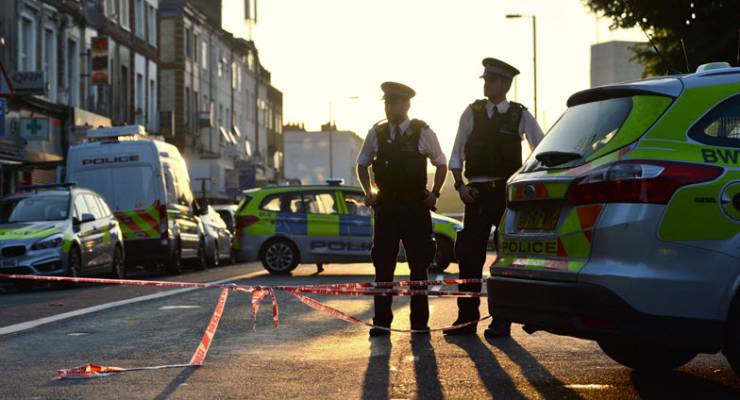
Australian media coverage of the London terror attacks has naturally focused on the stories of Australian victims. Tabloid coverage and commentary (including our national broadsheet-sized tabloid) has also focused on the nastiness of the perpetrators, particularly on their expressed religious motivations, with repeated sideswipes at anyone who shares a similar religious background.
As Crikey reported yesterday, even the most recent attack on a Muslim centre in Finsbury Park had some elements of our media describing the incident as a revenge attack, as if to suggest the victims somehow deserved to be mowed down by a man driving a van. Despite the man’s hate-filled and murderous rant, and notwithstanding Prime Minister Theresa May’s recognition that this was a terrorist attack, most Australian newspapers humanised the perpetrator and barely mentioned the “T” word.
It’s unlikely that this attack will lead to a major rethink of our counter-terrorism law or policy the British PM has promised. But just how much confidence do British Muslims have in their government?
Dr Sadek Hamid, an author and researcher at Oxford University, is deeply critical of the PREVENT program used by the government to counter not just violent extremism but all forms of what it sees as extremism.
“The PREVENT policies represent hugely divisive interventions that have been criticised for the dubious evidence base underpinning them and for the harmful effects they have had within British Muslim communities. The opposition from a broad range of civil society organisations, teaching professions, academics has been well documented. Not surprisingly, organisations in reception of government funding have defended its effectiveness.”
[How did the Australian media cover the Finsbury Park attack?]
Hamid sees the policy approach of tackling “Islamism” as deeply flawed. “The use of the term Islamism is ill defined and unhelpful as it includes many politicised Islamic organisations that are effective in challenging jihadi rhetoric. And, also given that right-wing extremist groups have been rising for years — there has not been given the same amount of attention even though individuals have been involved in carrying out hate crimes against Muslims.”
Hamid is concerned about the co-option of far-right rhetorical themes in mainstream British politics and media. He referred me to this article by former political columnist for the Daily Telegragh, Peter Oborne. “Far-right messaging is co-opted by the conservative party and indirectly through their politically aligned media publications.”
David Rosser Owen is a British Sufi, army veteran, journalist, author and former president of the Association of British Muslims. He is similarly critical of government policy and the role of overseas governments. “There has been extremism of various sorts around for a long time. ‘Islamist extremism’ has two problematic terms in it: ‘Islamist’ and ‘extremism’ — what do they mean by each of these, because in the popular mind they will be interpreted (and are being) simply as ‘Muslims’. What they need to have done — and they have been warned about it since at least the mid-1980’s — is restrict severely the access of Saudis and Saudi-trained Wahhabi preachers”.
[Rundle: as London becomes Baghdad, we will soon have to choose a side]
Owen believes the far-right isn’t as sophisticated as groups like Hizb ut-Tahrir (HT). The far-right’s rhetoric is rather reactive and has only a limited (and easily unpicked) ideology behind it; HT and similar Muslim groups have a rather more sophisticated ideology, that needs to be addressed by scholars in order to show up the flaws in it.
Yahya Birt is an academic at Leeds University. “The confidence of British Muslims in counterterrorism has been low for some time. It has reached an all-time nadir given that we have had four attacks in the past three months. There have been previous attempts at attacking mosques.”
So just how big is the far-right problem? “The far-right isn’t our biggest problem. The biggest manifestation of them in recent years was the English Defence League, which reached maximum strength in 2009 but has kind of dissolved a few years ago. At their height they could mobilise hundreds of men to dominate the city centre and they had to be contained by the police. Our biggest problem has been the right generally becoming more anti-immigrant, xenophobic.”
And what does the future hold for the majority of British Muslims who have integrated? If the past is anything to judge by, Birt sees a lot of work to be done. “Muslims have been seen through the security lens. I’ve heard even whispers from second- and third-generation professional types wondering whether they should leave the country. I think this feeling will die down eventually.”








Curious that D R Owen’s statement that the problem comes back to Wahhabi preachers is quoted approvingly here, when Irfun’s last Crikey article argued Wahhabism wasn’t the problem. Presumably the problem then is its teachers, or those few bad-apple types of them that take outrageous advantage of Saudi Arabia kindly flooding Muslim communities worldwide with Wahhabist mosques, madrasas and movement leaders. Or something.
” … quoted approvingly …”?
Yes. Precisely so.
Where was the approval?
Say what? You conscripted what Owen said to support your argument (that a major rethink of our counter-terrorism policies is necessary), but you don’t approve of what he said? Well, my apologies! I completely missed that when you quoted him on the need to severely restrict the influence of Wahhabists you did so ironically. I can’t imagine where I got the idea that you were attempting to present a serious argument, rather than just a bit of good-humoured parody. Oh, the laughs!
Irfan is doing what he always does, dolloping on the verbiage, always with the intent of obfuscating the issue and diverting attention from the core problem.
Note that he claims below to have have misunderstood taqiya – the koranic dispensation to lie to the infidel.
The usual, “hey, look over there!” taqiya, obfuscatory rabble-soothing.
Current chief exponent is, as always, Saudi and the finger pointing at Qatar.
Let’s not forget that the Saudi’s have just gifted hundreds of millions of dollars and thousands of cleric to Indonesia, presumably to teach ecumenicalism, tolerance and women’s right.
Oh, and that democracy thangy. Very big on that is yer average Saudi autocrat, just ask his nephew & son.
In my ancestral twin-dialects (Hindi and Urdu), the word “taqiyya” means a pillow. I sleep with 2 pillows at night. I guess that means I am doubly deceptive.
Noted, AR. Is it deception though – implying guilty ulterior motives? Or is it delusion – the pretence of exclusive access to innocent esoteric meaning? Irfan’s rather wobbly allegiance to truth seems to me to suggest something of a post-modernist strategem leaning more toward the latter.
His defence of Islamist ideology appears to be that any criticism of it is ideological (i.e. insufficiently esoteric), and hence bigoted. The two curious aspects of this strategy are (1) it seeks to collapse the distance between Islamist radicals and the Islamic religious (by accusing any attack on the former as an ‘automatic’ insult to the latter), and (2) it relativistically extends equal legitimacy to all forms of Islamism (no matter how murderous of intent), because Islam is ‘complicated’.
That said, I say give Irfan the stage. Let him be heard. Oh, for the love of God, let this man make an absolute fool of himself and his cause!
Beautifully put, clear & concise.
Judging by his past form, I would go with (1).
Thank you, AR. It’s a pleasure to discuss and disagree with you on how many ways our subject repeatedly outdoes himself in perfidity.